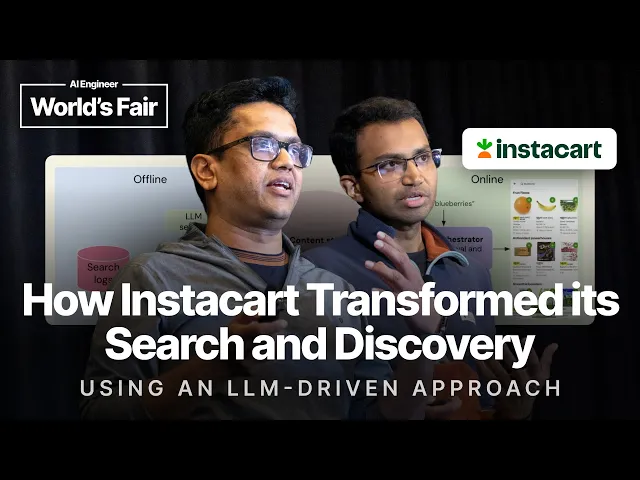Transforming search and discovery using LLMs — Tejaswi & Vinesh, Instacart

AI search revolution reshapes e-commerce discovery
In a world where customers expect instant, accurate results, traditional keyword-based search is rapidly becoming obsolete. Instacart's engineering team recently demonstrated how large language models (LLMs) are fundamentally transforming how users discover products online. The integration of AI-powered semantic search doesn't just enhance the technical backend—it completely reimagines the customer experience by understanding intent rather than merely matching text patterns.
Key Points
-
Instacart transitioned from keyword-based search to semantic search powered by LLMs, allowing their system to understand user intent and context rather than just matching terms.
-
They implemented a hybrid approach combining traditional retrieval methods with LLM-based ranking, resulting in a 12% improvement in search quality with minimal latency impact.
-
The team addressed challenges like vocabulary mismatch and query understanding through embeddings and intent classification, helping the system better understand what users actually want regardless of how they express it.
-
Despite concerns about computational costs, Instacart found that selective application of LLMs at critical points in the search pipeline delivered the best balance of performance and efficiency.
-
Continuous evaluation and experimentation were crucial to their success, with human evaluators providing feedback on search quality improvements.
The Real Revolution: Understanding Human Intent
The most profound insight from Instacart's transformation isn't the technical implementation—it's the fundamental shift in how machines interpret human communication. Traditional search operates on a simplistic matching principle: if a user types "apples," show products with "apples" in the description. But human language is messy, contextual, and full of ambiguity.
This matters tremendously because search isn't just a utility—it's the primary interface between users and products. When customers search for "healthy snacks for kids," they're expressing a complex need that involves nutrition, child-appropriate options, and convenience. Before LLMs, systems struggled with these nuanced requests, often returning technically correct but practically useless results.
The business impact is substantial. Instacart reported that their hybrid LLM approach improved search quality by 12%—a figure that translates directly to user satisfaction, reduced abandonment rates, and ultimately, increased revenue. As industry analyst Benedict Evans noted, "Search is the interface to inventory," and companies that master this interface
Recent Videos
How To Earn MONEY With Images (No Bullsh*t)
Smart earnings from your image collection In today's digital economy, passive income streams have become increasingly accessible to creators with various skill sets. A recent YouTube video cuts through the hype to explore legitimate ways photographers, designers, and even casual smartphone users can monetize their image collections. The strategies outlined don't rely on unrealistic promises or complicated schemes—instead, they focus on established marketplaces with proven revenue potential for image creators. Key Points Stock photography platforms like Shutterstock, Adobe Stock, and Getty Images remain viable income sources when you understand their specific requirements and optimize your submissions accordingly. Specialized marketplaces focusing...
Oct 3, 2025New SHAPE SHIFTING AI Robot Is Freaking People Out
Liquid robots will change everything In the quiet labs of Carnegie Mellon University, scientists have created something that feels plucked from science fiction—a magnetic slime robot that can transform between liquid and solid states, slipping through tight spaces before reassembling on the other side. This technology, showcased in a recent YouTube video, represents a significant leap beyond traditional robotics into a realm where machines mimic not just animal movements, but their fundamental physical properties. While the internet might be buzzing with dystopian concerns about "shape-shifting terminators," the reality offers far more promising applications that could revolutionize medicine, rescue operations, and...
Oct 3, 2025How To Do Homeless AI Tiktok Trend (Tiktok Homeless AI Tutorial)
AI homeless trend raises ethical concerns In an era where social media trends evolve faster than we can comprehend them, TikTok's "homeless AI" trend has sparked both creative engagement and serious ethical questions. The trend, which involves using AI to transform ordinary photos into images depicting homelessness, has rapidly gained traction across the platform, with creators eagerly jumping on board to showcase their digital transformations. While the technical process is relatively straightforward, the implications of digitally "becoming homeless" for entertainment deserve careful consideration. The video tutorial provides a step-by-step guide on creating these AI-generated images, explaining how users can transform...
